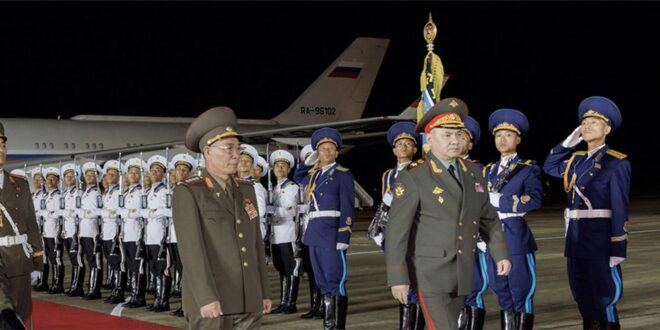It is in both countries’ interests to cooperate, since each can provide the other with something in short supply: Russia needs artillery shells for its war, while North Korea needs humanitarian aid.
The extensive media coverage of Russian Defense Minister Sergei Shoigu’s recent visit to Pyongyang contained two main messages: that Russia and North Korea are allies, and that the primary focus of the meeting was Russia’s war against Ukraine. Neither of these assertions, however, is an accurate reflection of the current state of relations between Russia and North Korea.
For a start, much to Pyongyang’s chagrin, Russia is not in fact an ally of North Korea, unlike the Soviet Union. Since the current cooperation agreement was signed between the two countries back in 2000, Moscow’s policy on North Korea has largely consisted of backing Beijing: voting for UN sanctions agreed upon with China, and vetoing those that China didn’t like.
For all Pyongyang’s efforts to diversify its trade relations away from China, economic ties between Russia and North Korea are practically non-existent. In terms of its rhetoric on North Korea’s nuclear missile program, Moscow also follows China’s lead, condemning it when China does so, and showing more understanding when Beijing does the same.
After Russia’s full-scale invasion of Ukraine in February 2022, it was widely reported that North Korea was actively backing Russia, and was even supplying the Russian army with ammunition. But it’s not quite as straightforward as that.
All the messages of support for the invasion and Russia’s annexation of parts of Ukraine were only published in North Korean media meant for foreign audiences. They never reached the North Korean people, and all domestic publications have simply remained silent on the issue of Russia’s war against Ukraine.
Nor is there anything to suggest that Pyongyang received anything from Moscow in exchange for its supportive rhetoric. Back in 2014, North Korea became one of just a handful of countries to recognize annexed Crimea as Russian territory, hoping to receive some kind of economic incentive in return. But none was forthcoming, as the Russian ambassador to North Korea has freely admitted.
There is no hard evidence available that North Korea is truly supplying Russia with ammunition, though it’s entirely possible: after all, North Korea’s munitions industry is highly developed, artillery plays a key role in the country’s military doctrine, and the Russian army is in need of shells.
Another important factor in relations between Moscow and Pyongyang is that the invasion of Ukraine has created a lot of tension between Russia and South Korea. Before the war, Seoul’s approach could have been described as: “We are U.S. allies, but as far as that alliance allows, we would like to get along with Russia.” After the start of the invasion, Seoul was quick to speak up in support of Ukraine, prompting Russia to add South Korea to its list of “unfriendly countries.”
So far, Seoul has refrained from directly supplying Ukraine with arms, but in July 2023, South Korean President Yoon Suk Yeol visited Kyiv and pledged to supply Ukraine’s armed forces with essential frontline supplies, such as first-aid kits and helmets.
It’s entirely possible that Shoigu’s visit to Pyongyang was at least in part the Kremlin reacting to Yoon’s visit to Kyiv. After all, during his visit, Shoigu took part in the celebrations of the 70th anniversary of the end of the Korean War, which Pyongyang refers to as “victory over the American imperialists and their South Korean puppets.” Russian delegations have not previously attended such events.
This, combined with the clearly Soviet aesthetic of the visit, ahead of which Pyongyang was decorated with red banners welcoming “comrade” Shoigu, suggests that Pyongyang is looking back to Cold War times in hope of a return to the flow of economic aid from Moscow.
Long-time observers of North Korea know that no matter how diverse the changes happening in the country, they nearly always end in a return to the status quo. The cautious cooperation with South Korea that got underway in the early 2000s has collapsed, and attempts to improve relations with Japan have been unsuccessful. Pyongyang’s attempts to diversify away from its dependence on China toward Russia or South Korea came to nothing, just like North Korea’s notorious summits with former U.S. president Donald Trump. Any economic reforms at home are inevitably followed by a wave of counter-reforms.
It’s entirely possible, therefore, that Shoigu’s visit to Pyongyang will turn out to be a mere formality, like the summit between North Korean leader Kim Jong Un and Russian President Vladimir Putin in Vladivostok in 2019. These meetings are not completely devoid of meaning because they are later mentioned in various reports around the world: often with the conclusion that “Russia retains a certain influence in North Korea.” Indeed, one of Russia’s key goals in North Korea ever since the early years of Boris Yeltsin’s presidency has been to increase its diplomatic weight there while avoiding taking any concrete action.
At the same time, it can’t be completely excluded that this time will be different, because it appears to be in both sides’ interests to cooperate. Russia needs artillery shells for its war, and North Korea can produce them. North Korea needs humanitarian aid because its isolation during the pandemic has resulted in famine, and Russia can provide that aid.
For now, it’s hard to predict anything with confidence. There are a great many factors that could influence how events develop: the situation at the front; the state of the Russian defense industry; North Korea’s readiness to open its borders and accept foreign aid; China’s opinion; the positions of Putin and Kim; the efforts of key officials in both countries; and, quite possibly, some completely unpredictable events. Still, while change in North Korea may be rare and fleeting, history also shows that drastic change sometimes comes when it is least expected.
 Eurasia Press & News
Eurasia Press & News




